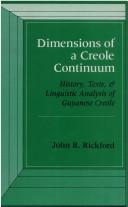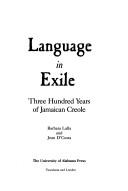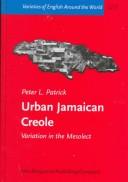| Listing 1 - 10 of 72 | << page >> |
Sort by
|
Book
ISBN: 3961101124 Year: 2019 Publisher: Berlin, Germany : Language Science Press,
Abstract | Keywords | Export | Availability | Bookmark
 Loading...
Loading...Choose an application
- Reference Manager
- EndNote
- RefWorks (Direct export to RefWorks)
This book tackles the divisive question of the Stative/Non-stative distinction by going straight to the root of the lexical items that have been at the heart of this discussion. It provides an analysis of property items (Dual Aspectual Forms) couched in the syntax-semantics interface eliminating the false dichotomy at the base of the controversy in the field and the suggestion that a lexical item needs be unambiguously Stative or Non-stative. What we see in this work is theoretical grounding for a flexible group of lexical items comprising both verbs and adjectives underlyingly with allowances made for derivation into either category. The result is a work that is conceptually and theoretically appealing and one that brings consensus.
Book
Year: 1953 Publisher: Amsterdam: North-Holland.,
Abstract | Keywords | Export | Availability | Bookmark
 Loading...
Loading...Choose an application
- Reference Manager
- EndNote
- RefWorks (Direct export to RefWorks)
Book
Year: 1953 Publisher: Amsterdam: Noord-Hollandsche uitgevers maatschappij,
Abstract | Keywords | Export | Availability | Bookmark
 Loading...
Loading...Choose an application
- Reference Manager
- EndNote
- RefWorks (Direct export to RefWorks)
Book
Year: 1924 Publisher: New York : American Folk-Lore Society,
Abstract | Keywords | Export | Availability | Bookmark
 Loading...
Loading...Choose an application
- Reference Manager
- EndNote
- RefWorks (Direct export to RefWorks)

ISBN: 0804713774 Year: 1987 Publisher: Stanford (Calif.): Stanford university press
Abstract | Keywords | Export | Availability | Bookmark
 Loading...
Loading...Choose an application
- Reference Manager
- EndNote
- RefWorks (Direct export to RefWorks)
Book
ISBN: 0631136568 9780631136569 Year: 1984 Publisher: Oxford : Blackwell,
Abstract | Keywords | Export | Availability | Bookmark
 Loading...
Loading...Choose an application
- Reference Manager
- EndNote
- RefWorks (Direct export to RefWorks)
Pidgin English --- Creole dialects, English --- Creole dialects, English. --- Pidgin English.

ISBN: 081738409X 0585140944 9780585140940 9780817384098 0817304479 9780817304478 9780817355654 0817355650 Year: 1990 Publisher: Tuscaloosa, Ala. University of Alabama Press
Abstract | Keywords | Export | Availability | Bookmark
 Loading...
Loading...Choose an application
- Reference Manager
- EndNote
- RefWorks (Direct export to RefWorks)
""An important addition to studies of the genesis and life of Jamaican Creole as well as other New World creoles such as Gulla. Highlighting the nature of the nonstandard varieties of British English dialects to which the African slaves were exposed, this work presents a refreshingly cogent view of Jamaican Creole features."" --SECOL Review ""The history of Jamaican Creole comes to life through this book. Scholars will analyze its texts, follow the leads it opens up, and argue about refining its interpretations for a long time to come."" --Journal of Pidgin & C
Book
Year: 1936 Publisher: New York : Columbia University Press,
Abstract | Keywords | Export | Availability | Bookmark
 Loading...
Loading...Choose an application
- Reference Manager
- EndNote
- RefWorks (Direct export to RefWorks)
Folklore --- Blacks --- Creole dialects, English --- Music --- Folklore.
Book
ISBN: 9783969390917 3969390915 Year: 2022 Publisher: Muenchen LINCOM GmbH
Abstract | Keywords | Export | Availability | Bookmark
 Loading...
Loading...Choose an application
- Reference Manager
- EndNote
- RefWorks (Direct export to RefWorks)

ISBN: 9789027298539 902729853X 9781556194481 155619448X 155619448X 9027248753 1282162799 9786612162794 9789027248756 Year: 1999 Publisher: Amsterdam Philadelphia J. Benjamins Pub.
Abstract | Keywords | Export | Availability | Bookmark
 Loading...
Loading...Choose an application
- Reference Manager
- EndNote
- RefWorks (Direct export to RefWorks)
A synchronic sociolinguistic study of Jamaican Creole (JC) as spoken in urban Kingston, this work uses variationist methods to closely investigate two key concepts of Atlantic Creole studies: the mesolect, and the creole continuum. One major concern is to describe how linguistic variation patterns with social influences. Is there a linguistic continuum? How does it correlate with social factors? The complex organization of an urbanizing Caribbean society and the highly variable nature of mesolectal speech norms and behavior present a challenge to sociolinguistic variation theory.The second chief aim is to elucidate the nature of mesolectal grammar. Creole studies have emphasized the structural integrity of basilectal varieties, leaving the status of intermediate mesolectal speech in doubt. How systematic is urban JC grammar? What patterns occur when basilectal creole constructions alternate with acrolectal English elements? Contextual constraints on choice of forms support a picture of the mesolect as a single grammar, variable yet internally-ordered, which has evolved a fine capacity to serve social functions.Drawing on a year’s fieldwork in a mixed-class neighborhood of the capital city, the author (a speaker of JC) describes the speech community’s history, demographics, and social geography, locating speakers in terms of their social class, occupation, education, age, sex, residence, and urban orientation. The later chapters examine a recorded corpus for linguistic variables that are phono-lexical (palatal glides), phonological (consonant cluster simplification), morphological (past-tense inflection), and syntactic (pre-verbal tense and aspect marking), using quantitative methods of analysis (including Varbrul). The Jamaican urban mesolect is portrayed as a coherent system showing stratified yet regular linguistic behavior, embedded in a well-defined speech community; despite the incorporation of forms and constraints from English, it is quintessentially creole in character.
| Listing 1 - 10 of 72 | << page >> |
Sort by
|

 Search
Search Feedback
Feedback About UniCat
About UniCat  Help
Help News
News